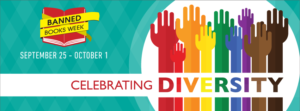 It’s banned books week, a time when we’re supposed to get excited about books that are controversial to the point that some schools and communities ban them from their libraries.
It’s banned books week, a time when we’re supposed to get excited about books that are controversial to the point that some schools and communities ban them from their libraries.
The American Library Association, which sponsors the week annually, has devoted this year’s event to diverse books. The ALA notes that many of the banned books are written by minorities in society. They are banned because they bring to the forefront issues communities do not wish to discuss, issues that could bring change to communities that don’t want it.
The banning of books is always done out of fear. Usually fear that the ideas in the books will change things. That they will make things not the way they are, and those who ban them desperately seek to keep things the way they are.
But that is the opposite goal of knowledge. And that’s what books are –a gateway to information. They are meant to expand our minds and challenge our notions. They can bring us closer to people we have never met before, people whom we would never in our lifetimes ever personally experience if it weren’t for a book.
So, I hope you’ll grab a book that’s banned this week. Take a look at the world from a different perspective, and enjoy the knowledge you gained from it. Here are some links to some books from diverse authors.
- Top Ten Banned Books that Changed the Face of Black History
- Eight Banned Books by Latino Authors
- Eleven Asian Pacific American Authors You Should Read
There are few things that aggravate me more than the thought of banning books. There are some works of literature I personally don’t like, but I certainly wouldn’t demand they be banned. If other people want to read something, then they should be allowed to read it. It’s not the right or prerogative of a group of self-righteous and self-appointed individuals to determine what the rest of us read or see.
For example, I don’t particularly care for either the Christian Bible or Jewish Torah, but others have the right to read those works. On the other hand, I shouldn’t have to sneak around with a copy of “Urban Aboriginals” (a book about the leather-oriented lifestyle) just because some holier-than-thou religious aficionado considers it obscene.
Banning books of any kind is a violation of free speech and one step towards totalitarianism. I’ve known people who have lived under such harsh ideologies, and it’s frightening.
Yes, banning books is problematic because it limits access to knowledge.
I actually used to cover libraries in Kansas City, and one of the interesting dilemmas they faced was when people suggested they were banning books when they were, in fact, making budgetary decisions. Not all books can be purchased by a library. But a choice not to purchase isn’t necessarily an active attempt to ban a book, even though it has the same practical effect for patrons.
The wonderful thing about the Internet, there are many resources available to people who want knowledge, even if they can’t necessarily find it in their own town.